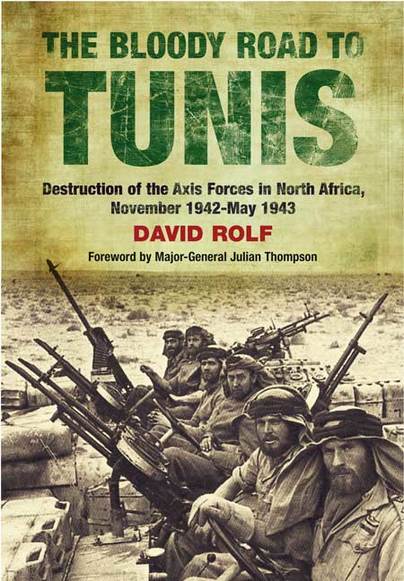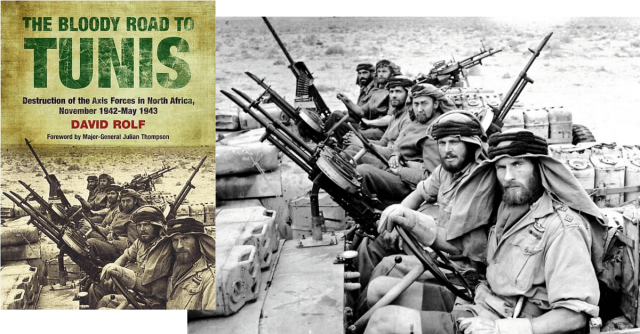Here we have a new paperback edition of a superior account of the war in North Africa by David Rolf first published back in 2001. It tells the story of the extremely troublesome campaign the Allies endured in their quest to conquer Tunisia. The campaign was fraught with problems, some of their own making; where poor leadership was evident and where key characters clashed. The seeds of the divisions between some British and American generals were sown in Tunisia.
While the timetable of the actual fighting is covered in commendable detail we are inevitably drawn to the fragile relationships between the belligerent nations and their allies. Germans and Italians, British and Americans, everyone and the French – there were endless disputes. Even within the ranks of their own armies there were plenty of British and American senior officers who loathed their countrymen for all manner of reasons. Much has been made of the testy relations between the new to the scene Americans and often supercilious British red tabs, but there was so much more to it as rivalries within the American set up and the ever present knifings going on between Monty and anyone who fell foul of his inflated ego all impacted on progressing the campaign.
It didn’t stop there as a bullish 8thArmy advanced out of Libya the powerful spirit of self-belief fostered within it was bound to impact on relations with Anderson’s 1st Army. There was a mutual loathing between units of the two British armies. Meanwhile the Germans were having all their usual doubts about the Italians and there was not a lot of love lost between officers of the German high command especially when it came to the reputation and performance of Erwin Rommel who had few friends in Rome where the highly efficient Albert Kesselring managed a difficult balancing act between reality and the delusions of Hitler and Mussolini. A German prisoner told his British captor “We’ve got the Italians and you’ve got the Americans. We could rule the world!” The French, meanwhile, were busy arguing over who was rightfully in charge of things and feuding between Giraud and De Gaulle caused the Anglo-Americans no end of headaches. What a story this is!
It might be easy to forget there was a lot of hard fighting going on, but as the Germans carried out skilful defensive actions accompanied by frequent attempts to unhinge the Allied line of advance to delay or even bring a halt to operations the Allies maintained an often painful advance towards final victory, suffering numbers of casualties the British, especially, would miss in 1944/45. Rapidly shrinking resources did not help the Axis cause any more than the huge weight of materiel in favour of the Allies who seemed to have plenty of everything except perhaps seasoned combat troops. For all their problems the Germans were still managing to get re-enforcements and equipment into Africa right until the end when Allied air and naval dominance proved too much.
On the Allied side it isn’t so straightforward to identify who came out of victory in May 1943 with a huge amount of credit. Montgomery, for all his many faults, had created a winning team and the morale of hisarmy was on a high as it led the British Commonwealth charge bringing relief and the joyful peel of church bells to Britain. You cannot sit on the fence where Montgomery is concerned. His many pluses were negated by his boorish manner and manipulation of facts to enhance his reputation. His methodical nature offers ammunition to an accusation of excessive caution and events in the advance out of Libya when large parts of the Axis army might have been cut off and destroyed tend to support this.
Monty’s idea of teamwork was a group of people below him doing exactly what he ordered and nothing so silly as a consensus of opinion leading to joint action. There is a quote from his early life in the first volume of the Hamilton trilogy where Monty’s mother tells one of his older siblings “Go and see what Bernard is doing and tell him to stop it.” Neither Alexander in Cairo or Brooke in London ever mastered her determined management of his behaviour and it would fall to Eisenhower to be strong willed enough to do it when things were at their worst in North-West Europe. Tactless, overblown and self-obsessed he may have been, but Monty was a winner, like it or not.
History has not been too kind to 1st Army commander Kenneth Anderson and I have to say I don’t see an answer to that. He was something of a difficult man to like and although he won victory in Tunisia his leadership never enjoyed the confidence of the men who mattered and Montgomery would see to it that he lost command of 2nd Army to Miles Dempsey before Overlord. Patton admired his blunt demeanour but assessed him to be lacking in brains and there seems to be universal agreement he was out of his depth.1stArmy ceased to exist after Tunisia as the demands of Husky and Overlord stripped it barewith little sign of regret among Anderson’s contemporaries.
On the American side the campaign accelerated the greatness of Bradley and Patton and set in stone the growing presence of Eisenhower, a man who knew he had a steep learning curve in front of him but who looked it square in the face. Bradley is often seen as something of a foil to Patton but his modesty and lack of a showboating personality took his career further. Patton’s tragic death in 1945 robbed us of any chance of seeing the two of them making shared assessments of events and their general-ship. Untimely death ensures Patton continues to steal Bradley’s lustre and maybe that would not have changed regardless of the road accident that did for him.
There were plenty of American brigade, divisional and corps level officers doing sound work but there were others who did not cut the mustard and they were all on the boat home living with the effects of the bruising nature of the business of high command. While the hapless II Corps commander Lloyd Fredendall remains the biggest casualty, where his disastrous handling of Kasserine gave Eisenhower the excuse he was looking for;the hard charging Paul Robinett escaped being fired by minutes when he was wounded by shellfire. Orlando Ward fell foul of Fredendall’s replacement, Patton; and 1stArmored passed to Ernest Harmon, a safe pair of hands if ever there was one.
Any book on the Tunisian campaign will inevitably look at the disaster at Kasserine and the author plays it with a straight bat, as he does throughout. The thing to do is put it in perspective, cut the crap and move on to the end result. There is no ignoring the fact that the American war machine had its problems in North Africa but the Americans did not sit on their hands (as if!) and pragmatists amongst British generals looked back to their own low points and recognised everyone has to start somewhere. Armies have to find their winning ways and these things do not happen overnight when facing a high quality enemy like the Panzerarmee. The brutal truth is that even for veterans of the desert war, the Germans were always stiff opposition; nearly always better led and generally more ruthless and resourceful. The message is simple – North Africa may have been a ‘sideshow’ in the minds of some; but it gave a sound education to the men who would win the European war.
Tunisia taught the American armour men a great deal and their Shermans would take them many more miles to final victory. The campaign also brought hard lessons for the infantry who knew at the end of it they would have to get better.
Graphic modern images of this come in Private Ryan and Fury!where key characters are shown to be men who had fought all the way from Africa with all that entails.
The author offers some nice touches and for me the best of them concerns the British paratroopers lauded by German prisoners as they passed their camp on a train. The Red Devils built their reputation in North Africa and left too many pioneers behind before they even got to Sicily, Normandy and the agony of Arnhem. When you see images of some of the 6th Airborne Division men who linked up with Rokossovsky’s Russians at Wismar on May 3rd 1945 it is easy to wonder how far some of them had come.
There is also room for a quote or two from the soldier journalist Ralph Ingersoll whose account of the American campaign;The Battle is the Pay Offis a book I inherited from my father. While it is a good read it does not have the power of the Australian Alan Moorhead’s equally contemporary trilogy on the desert campaign I listas a WW2 ‘must read’.
Difficult lessons were learned and the Germans and Italians were always capable of dishing them out and although the latter were often found to be wavering by their ally there was hard fighting from both right to the end even after it was clear all hope was lost. The Allies netted over a quarter of a million prisoners at the end of the war for Tunisia. We have to put this into perspective because for all the strategic doubts about fighting in Africa, it proved to be ruinous for the Axis. The loss of assets, human and material was grievous for the fascist war machine and although an invasion of Italy would seal the fate of Mussolini, his trajectory was clear when Tunis fell.
The North African campaign has been the stuff of many books and I have yet more in my ‘to do’ pile. It was where the labyrinth of the Anglo-American alliance was tested and taken to the next level. Someone might care to put a version number on it like a computer program. Even after victory in 1945 it is clear the thing was far from perfect but North Africa is where the dynamics of American dominance and British decline were configured. It could only have ever gone that way and anyone still bothered enough to lament the fact really needs to get a life.
When we think about Tunisia we might like to drop in the old favourite about little acorns. In a few weeks time as we remember VE Day the majesty of the mighty oak of 1945 will be celebrated seventy years on from the planting.
Reviewed by Mark Barnes for War History Online.

THE BLOODY ROAD TO TUNIS
Destruction of the Axis Forces in North Africa, November 1942-May 1943
By David Rolf
Frontline
ISBN: 978-1-84832-783-2

